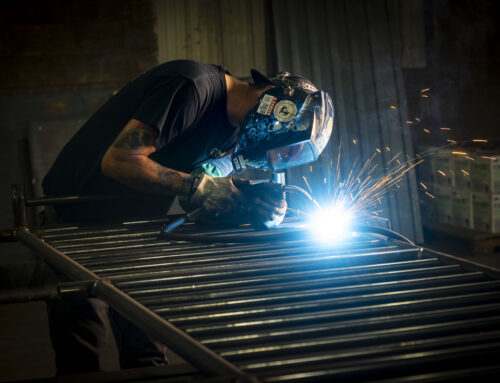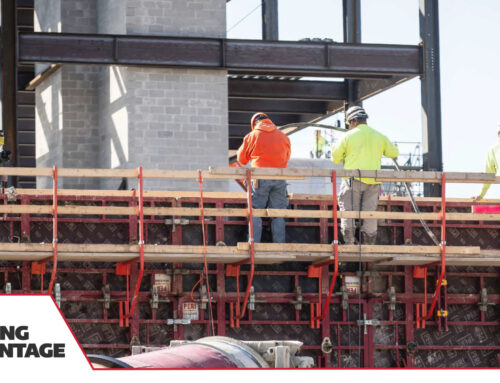Matt Marcellis, Executive Director of the Allied Construction Employers Association (ACEA), discusses issues facing the industry with Building Advantage’s Chris Mambu Rasch.
Chris Mambu Rasch
Matt, you were recently appointed as the Executive Director of the Allied Construction Employers Association (ACEA), can you explain what the organization is and who you represent?
Matt Marcellis
The ACEA is the umbrella organization for 11 different trade-specific associations and more than 125 union contractors that employ thousands of union tradesmen and women here in Southeast Wisconsin. The ACEA supports industry labor relations activities including collective bargaining, benefit fund trustees, contract administration, and dispute resolution among other things. We also participate on most of the industry’s labor-management boards and committees and do our best to support to signatory contractors wherever it may be needed.
Chris Mambu Rasch
What kind of benefits are involved with ACEA membership?
Matt Marcellis
ACEA is unique as the only association in the area that’s 100% union. We’re a varied group, with some larger players but also smaller contractors with only a handful of employees. My role is to make sure the interests of all ACEA contributors, from the larger companies to the smallest union shop are represented and addressed. Our members employ a substantial portion of Milwaukee’s union workforce, and I want to make sure that all of our contractors’ voices are heard in collective bargaining and at every table where we sit. Our ultimate goal is to make sure that all of our members can stay competitive and grow in this market.
Chris Mambu Rasch
ACEA just went through negotiations with a number of union trades, how did those negotiations work out for the contractors?
Matt Marcellis
This year was the first time I’ve been prominently involved in negotiations on behalf of the ACEA and it was definitely a learning experience. But I think it turned out well. Both sides handled the negotiations very professionally. I think the industry recognizes that treating one another as the enemy just doesn’t work. Obviously, management needs labor and labor needs management, so we all have to work together and keep the union industry strong for our market share to keep growing. It’s a balancing act of attracting and retaining the best workforce while also making sure that signatory contractors are profitable. I think both sides of the table – labor and management – recognize that, even if we don’t always immediately agree on how to get there.
Chris Mambu Rasch
How do you think being union contractors better positions your members in this market?
Matt Marcellis
Union labor can be a little more expensive up front although it’s always competitive. But if you hire a union contractor, you’re hiring the best in class. The work gets done on time and on budget. There are fewer if any delays, quality issues, or call-backs. For some of our members, a considerable portion of their work is fixing problems created by a non-union contractor the customer thought would save them money.
Anyone considering accepting a bid based on the sticker price alone should consider the potential for added future costs due to quality issues and/or delays that impact a developer’s timeline to pay back investors and start earning profit. It’s a concept we’ve discussed extensively at the CLMC, that is, capturing the whole cost of a project, not just the initial bid and build. And when you look at that whole cost of a project, the value of a union contractor really shines through.
Chris Mambu Rasch
The data shows that the number of employed construction workers is up from May of 2022 compared to May of 2021. What’s your sense of where the industry is headed?
Matt Marcellis
When it comes to the economic indicators, I’ve heard from members that everyone is busy right now. Manpower shortages seem to be the biggest issue as contractors look toward bidding on new work. Labor availability is an issue in most industries right now, but construction has been talking about it for several years. One of our goals as an industry, of course, is to make sure that if someone is interested in getting into construction, they’re going to work for one of our union contractors. But we’re recruiting people for careers, not just jobs. This goes back to my point about quality. You want someone working on your project that is passionate about their career and has trained for years to perfect their craft, not a person just doing construction as their latest job.
Milwaukee’s also done a great job of transitioning to new sources of revenue. We started as a manufacturing town and have now entered more into the entertainment and hospitality markets. With the Deer District and the Convention Center, Milwaukee is becoming a national destination that can handle large events that will garner national attention like the RNC in 2024. For a lot of companies, hosting and attending events in a city like Chicago can be expensive and cumbersome. Milwaukee is becoming a great alternative to these larger cities.
Chris Mambu Rasch
There’s a lot of developers trying to make deals happen in the city. What’s the construction industry’s role to help Milwaukee reach new heights?
Matt Marcellis
Again, I think this plays into the value of union construction. When you’re building entertainment venues or mixed-use spaces, your profitability is reduced every day that a project is late. That’s why there are liquidated damages clauses in most construction contracts. Before someone starts a project like that, they know exactly how much they can make on their investment. If delivery is even one week late, you’re messing with that developer’s and their investor’s money. What union contractors do better than anybody is deliver high quality projects on time so occupants can get into the space and the money can start flowing. We have the ability to keep developers building because we have the talent and the infrastructure to help them protect their investments.
Chris Mambu Rasch
You’ve mentioned your law background and ACEA’s summer newsletter mentioned a Wisconsin Appellate Court case pertaining to subcontractor negligence. Can you explain that case a bit and what it means for your members?
Matt Marcellis
The basic takeaway from that case, Mechanical Inc. v. Venture Electrical Contractors, Inc., is that if contractor A exceeds their allotted schedule and pushes back contractor B’s timeline, contractor B’s only recourse is spelled out in their contract. Contractor B cannot sue contractor A for negligence even if contractor A’s alleged negligent delay causes contractor B economic damages.
This case is important because it reinforces for subcontractors how important it is that they read their project contracts and follow any timeliness provisions strictly. You cannot rely on the courts to recompense you if you lose money because of the actions of a fellow subcontractor. You must make sure you do what you’re supposed to do contractually to avoid any kind of penalties from upstream parties.
Because of my construction law background, I regularly discuss general legal issues like this with ACEA members and enjoy the opportunity to include this type of information in our member communications.
Chris Mambu Rasch
Any other cases working their way through the courts that you and ACEA have your eye on?
Matt Marcellis
Currently before the WI Supreme Court is a case that has the potential to significantly impact how construction general liability (CGL) insurance operates in Wisconsin. ACEA became directly involved in this case when the attorneys for the respondents in this case asked our organization if we would be interested in submitting an amicus curiae, or “friend of the court” brief, to explain the potential practical repercussions of the case for contractors.
The basic facts of the case are these: In 2012, a homeowner contracted to add a pool complex to an existing house in Lake Geneva, Wisconsin. The pool complex included a main pool, a children’s pool, a patio, retaining walls, and various other associated structures. Upon completion, the pool began to leak and repairs were unsuccessful. In 2015, two separate engineering firms concluded that because of cracking in the shotcrete used in the main pool walls, water had eroded the soil under the complex. The pool complex and other features were subsequently demolished, re-sited, and rebuilt. The insurers for the various contractors who worked on the complex issued initial denials of coverage which relieved them of their duty to defend their clients in court proceedings seeking to identify fault for the leaks and damages. The insurers based this action on a legal concept called single integrated analysis, claiming that the pool complex was a single integrated system and insureds cannot appeal to their CGL policy when their own faulty workmanship caused the damage to the integrated system.
The amicus brief I filed on behalf of ACEA makes four key points for why the Court should rule for the contractors. First, ruling for the insurers would potentially eviscerate the Reasonable Expectations Doctrine, a legal concept especially relied on by small contractors, which states that the terms of an insurance policy must be read as they “would be understood by a reasonable person in the position of the insured” with any ambiguities “in the coverage terms . . . construed against the insurer.” Next, construction projects are not integrated in the way the insurers claim. The insurers in this case are attempting to equate construction projects to the manufacture of vitamin supplements and/or concrete paver blocks. This simply isn’t the case. Third, the various aspects of a construction project are not integrated like the ingredients of a pill or components of a paver, but rather are interconnected. They can be removed, repaired, repurposed, or demolished without impacting the viability of the project as a whole. Finally, allowing insurers to avoid their duty to defend via an initial denial of coverage using the integrated systems analysis would unfairly favor insurers and hurt small contractors, those with the fewest resources to expend on legal matters, the most.
ACEA is confident the WI Supreme Court will reach the right decision. We’ve been invited to take part in oral arguments, scheduled in September, and are considering that possibility as well. We’ll keep our members updated.





